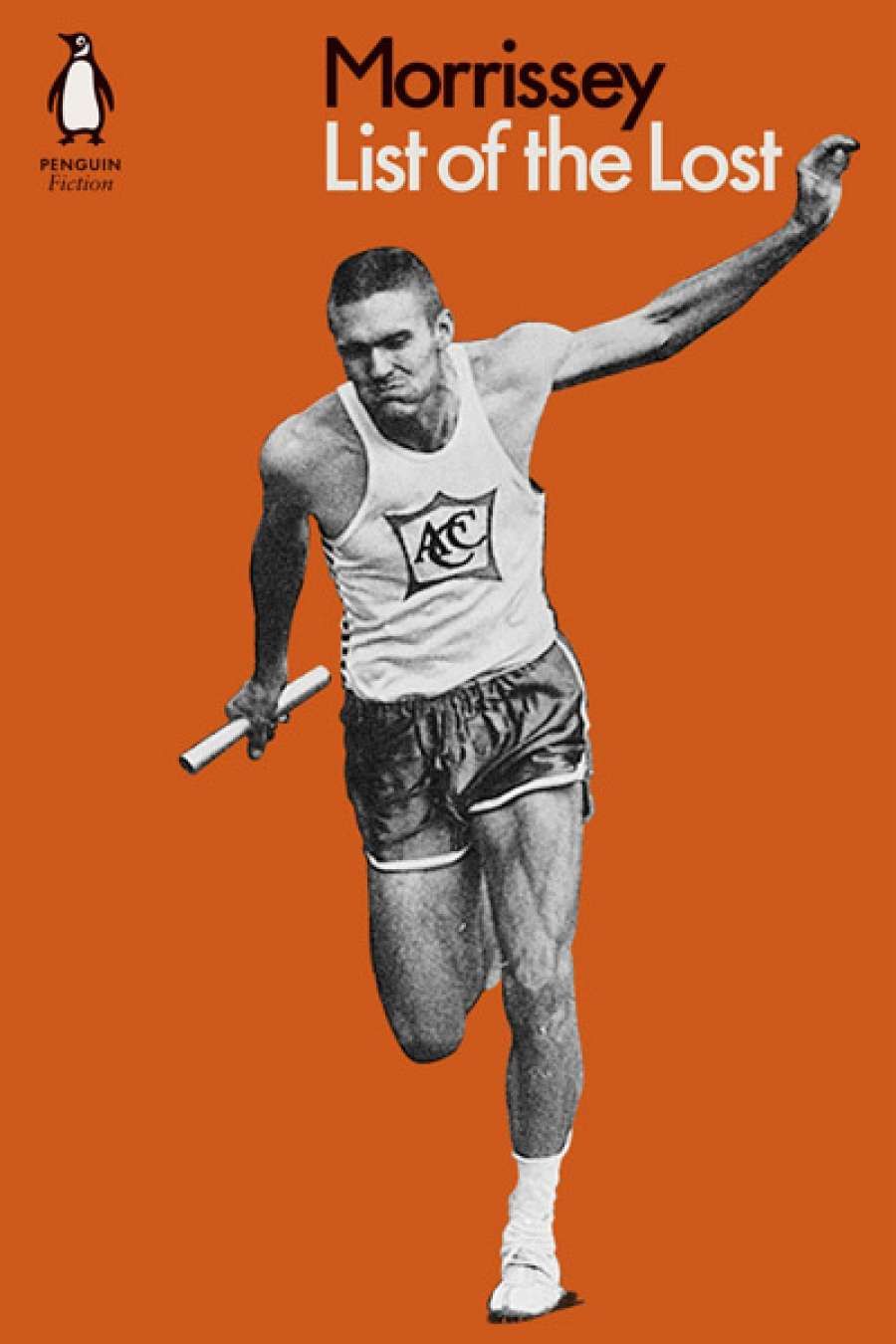
- Free Article: No
- Contents Category: Fiction
- Custom Article Title: Barnaby Smith reviews 'List of the Lost' by Morrissey
- Book 1 Title: List of the Lost
- Book 1 Biblio: Penguin, $19.99 pb, 128 pp, 9780141982960
Set in Boston in 1975, the book centres on four young men who make up a collegiate track relay team, their coach, and the odd girlfriend. As one of the best teams in the land, they attend a special training retreat, during which the apparent leader of the team, Ezra, accidentally kills a tramp, or 'intimidating ding-a-ling wreck', in a forest. This event, in a vaguely supernatural way, effects a series of horrendous misfortunes for the quartet – not that at any point the reader is particularly invested in their plight, what with the lack of strong character distinctions between the four and Morrissey's random expositions on various subjects, in which supposedly important plot pivots get rather lost.
Morrissey's style is comparable to a teenager's attempt at mimicking his or her Beat Generation heroes, and is a soup of unnecessary and pretentious descriptors, tenuous metaphors, and clumsy chiasmus, coming closer to Russell Brand's overly mannered verbosity than his hero, Wilde. As good an example as any are some of the novel's opening lines introducing the young athletes:
You would be offered a hearty shake of the javelin hand as expressions of possession of command from the four boys, each one fully developed into the blissful torment of their turnabout twentieth year – a pleasantly resolved marital union almost closed off in its camaraderie to the onlookers of the mookish greater world.
 Morrissey (photograph by Charlie Llewellin via Wikimedia Commons)
Morrissey (photograph by Charlie Llewellin via Wikimedia Commons)
This paragraph eventually ends after four pages. Such passages are more frustrating and tedious than grimace-inducingly bad; he reserves his most infuriating rhapsody for dialogue (all written in italics, for some reason), which not only serves no purpose of characterisation, but makes his characters seem pompous and unlikable, as in one exchange between Ezra and his girlfriend Eliza:
"I have an old soul," begins Eliza.
"I am a model of healthy humanity," chops Ezra.
"Friendship is a waste of time," lobs Eliza.
"I dream of a booze-filled orgy," shoots Ezra.
"I am a booze-filled orgy," is Eliza's reverse-twist.
"I have erotic curiosities," topspins Ezra.
...
"I am a puzzle,"
"I, a solution,"
"I am flimsy,"
"I am whimsy,"
[editor's note: all styling is Morrissey's]
The appeal of Morrissey's best lyrics is their directness, expressing personal vulnerability with an impassioned sincerity, and they are therefore relatable. This extravagant, affected toying with language is a stark contrast: forced, turgid, masturbatory, and aloof.
'It is unfortunate and perhaps surprising ... that he has produced something as preposterous as List of the Lost'
List of the Lost is made more difficult still by the degree to which the author prioritises his personal opinions and moral crusades. Truman Capote once said that the writer should not embark on writing a story until he or she has exhausted all the emotion they feel towards it. It feels like Morrissey approached his novel brimming with emotion over the many bones he has to pick with the world. There are uncontrolled tirades against eating meat, government, the judicial system, television, the British monarchy, Ronald Reagan, and, inexplicably given the novel's historical setting, Margaret Thatcher. Most strange though is a bizarrely detailed denunciation of Winston Churchill and his role in overcoming Hitler, complete with condemnation of how the 'supernatural agent' and code-cracker Alan Turing was edited out of history due to his homosexuality. The belligerence of these bitter diatribes makes for uncomfortable reading.
There is but one section where both the bombastic wordplay and venomous polemic are relaxed. The death of the mother of one of the main characters is described with an unlikely delicacy and is almost moving, but that is as compelling as the book gets.
A potentially kinder way to view List of the Lost might be as an allegory: it is hardly a stretch to compare the dynamics of a four-way relay team, with its 'combined methodology of four minds', to that of a four-piece band such as The Smiths. And, knowing Morrissey's proclivity for self-aggrandisement, it is not too absurd to suggest he may even have had the fall of man itself on his mind with this ostensibly parochial tale.
The disaster that is this novel will not harm Morrissey's artistic legacy, indeed, its general weirdness may even add to his mystique. But on its own terms as an attempt at serious literature it is an uncoordinated, naïve, and painfully indulgent shambles.


Comments powered by CComment